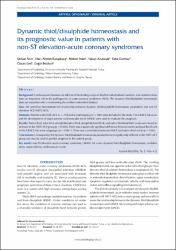Dynamic thiol/disulphide homeostasis and its prognostic value in patients with non-ST elevation-acute coronary syndromes

View/
Access
info:eu-repo/semantics/closedAccessDate
2018Author
Sivri, SerkanKasapkara, Haci Ahmet
Polat, Melike
Alsancak, Yakup
Durmaz, Tahir
Erel, Ozcan
Bozkurt, Engin
Metadata
Show full item recordAbstract
Background: Cardiovascular diseases are still one of the leading causes of death in industrialised countries, and oxidative stress plays an important role in the pathogenesis of acute coronary syndromes (ACS). The dynamic thiol/disulphide homeostasis plays an important role in maintaining the oxidant-antioxidant balance. Aim: We aimed to demonstrate the relationship between dynamic thiol/disulphide homeostasis parameters and non-ST elevation ACS (NSTE-ACS). Methods: Patients with NSTE-ACS (n = 210) and a control group (n = 185) were included in the study. The GRACE risk score and the development of major adverse cardiovascular event (MACE) were used to evaluate the prognosis. Results: Native thiol, total thiol, disulphide/native thiol, disulphide/total thiol, and native thiol/total thiol levels were found to be lower in the NSTE-ACS group (p < 0.001). There was a statistically significant difference between native and total thiol levels in the GRACE risk score subgroups (p < 0.001). There was a correlation between MACE and native thiol levels (p = 0.04). Conclusions: Consequently, the dynamic thiol/disulphide homeostasis parameters were significantly different in the NSTE-ACS group and may be used to predict prognosis in this patient group.
Source
KARDIOLOGIA POLSKAVolume
76Issue
2Collections
- WoS İndeksli Yayınlar Koleksiyonu [3310]
- Yayın Koleksiyonu [38]

















